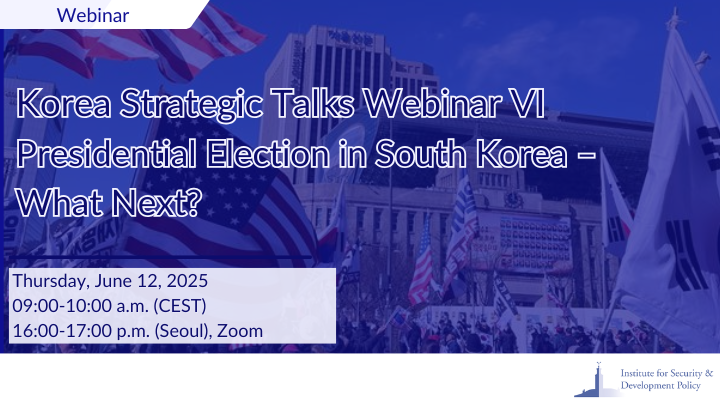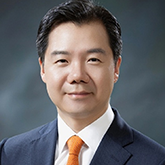Korea Strategic Talks Webinar VI: Presidential Election in South Korea – What Next?

Did you miss this webinar? The full recording is available on ISDP’s YouTube channel.
On June 3rd, South Korea will hold its ninth presidential election. The election follows a very turbulent time in South Korean politics, initiated by former President Yoon calling for martial law on December 3rd last year. After the Constitutional Court upheld the National Assembly’s impeachment vote, President Yoon was officially removed from power on April 3rd.
The first Strategic Talk for 2025 will take place on June 12 at 09.00 hrs Stockholm time and 16.00 hrs Seoul time. Our guests for this session are Prof. Eunjung Lim, Kongju University, and Prof. Jae Seung Lee, Director, Ilmin International Relations Institute.
In June 2024, the ISDP Stockholm Korea Center introduced a new series of “Korea Strategic Talks,” to further promote dialogue and exchange of views related to the developments on the Korean peninsula. The overall aim of the initiative is to further increase the understanding of the many factors and policies that impact political and security developments. We invite scholars and experts from different backgrounds to a conversation moderated by Mats Engman, Head of the Stockholm Korea Center. By conducting two or three talks within a short time span, we believe it will enable us to identify possible differences in understanding, assessments, and policies.
The Strategic Talks are live, online, and recorded for later use. A typical session runs for 60 minutes. Occasionally, we will also summarize a Strategic Talk or a series of talks into a publication.
This third round of Strategic Talks will feature two sessions: one with two South Korean experts (12 June) and one with two US experts (17 June), both discussing the potential implications of the June Presidential election.
During this third series of talks, we will concentrate our discussion on domestic political development in South Korea, following the outcome of the presidential election. Some of the issues we will discuss are.
- Can we already say something about possible policy shifts in foreign and defense policies?
- How will the outcome impact prospects for inter-Korean relations and engagement with DPRK?
- What possible implications will the outcome have on the ROK domestic situation, a continuation of societal division, or a return to more of a compromise?
- How have domestic institutions handled the political turmoil following the martial law declaration on December 3rd?
Speakers:
 Prof. Eunjung Lim is currently a Professor at Division of International Studies, Kongju National University (KNU). Her areas of specialization include international cooperation in the Indo-Pacific, comparative and global governance, and energy, nuclear, and climate change policies of East Asian countries. She previously served as a board member of Korea Institute of Nuclear Nonproliferation and Control (KINAC) from May 2018 to September 2024, and currently serves as a member of Policy Advisory Committee for Ministry of Unification.
Prof. Eunjung Lim is currently a Professor at Division of International Studies, Kongju National University (KNU). Her areas of specialization include international cooperation in the Indo-Pacific, comparative and global governance, and energy, nuclear, and climate change policies of East Asian countries. She previously served as a board member of Korea Institute of Nuclear Nonproliferation and Control (KINAC) from May 2018 to September 2024, and currently serves as a member of Policy Advisory Committee for Ministry of Unification.
Before joining the KNU faculty, Dr. Lim served as an Assistant Professor at College of International Studies, Ritsumeikan University, in Kyoto, Japan. She also taught at several universities in the United States and Korea, including Johns Hopkins University, Yonsei University, and Korea University. She has been a researcher and a visiting fellow at academic institutes including the Center for Contemporary Korean Studies at Interfaculty Initiative in Information Studies at the University of Tokyo, the Institute of Japanese Studies at Seoul National University, the Institute of Japan Studies at Kookmin University, and the Institute of Energy Economics, Japan (IEEJ).
She earned a B.A. from the University of Tokyo, an M.I.A. from Columbia University’s School of International and Public Affairs, and a Ph.D. from Johns Hopkins University’s School of Advanced International Studies.
 Prof. Jae-Seung Lee is Professor and Jean Monnet Chair at Korea University’s College & Graduate School of International Studies. He directs the Jean Monnet EU Centre of Excellence and the Nordic-Benelux Center. A specialist in international political economy, his research focuses on regional cooperation, energy security, and European affairs. Prof. Lee frequently contributes to major Korean newspapers and has appeared as a commentator on BBC, CNN and Korean media.
Prof. Jae-Seung Lee is Professor and Jean Monnet Chair at Korea University’s College & Graduate School of International Studies. He directs the Jean Monnet EU Centre of Excellence and the Nordic-Benelux Center. A specialist in international political economy, his research focuses on regional cooperation, energy security, and European affairs. Prof. Lee frequently contributes to major Korean newspapers and has appeared as a commentator on BBC, CNN and Korean media.